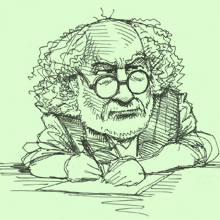
Peter Nieuwendijk es un artista holandés que, además de su extensa actividad periodística y participante en certámenes internacionales (donde obtuvo múltiples premios), también fue productor/director de Cartoon Festivals en Holanda, así como uno de los Cofundadores de FECO (Federación de Organizaciones de Cartoonistas) (1985). Fundador de la Asociación Holandesa de Cartoonistas “De Tulp” (1983). Editor jefe de la Revista FECONEWS. Presidente General de FECO (de mayo de 2009 a junio de 2013)
OMS - La primera pregunta que surge: si es cierto que el primer problema del avance de la edad corporal es la visión y el poder de las manos firmes, la creatividad, disfrazada de ismos, como los puntillismos, expresionismos, impresionismos, cubismos, futurismos... superar estos handicaps. ¿Con el tiempo, con nuevas técnicas, con instrumentos alternativos que recrean el rasgo personal? Es decir, los apretones de manos, las miradas fallan, pero el humor persiste, ¿o no?
Peter Nieuwendijk - Sí, claro, pero todo depende de tu creatividad personal. Cuando me lastimé la mano derecha (y no pude usar el brazo durante 2 años) comencé a usar la mano izquierda y aprendí por mi cuenta a pintar y dibujar como zurdo. También con la izquierda aprendí por mi cuenta a usar Photoshop como ayuda.
OMS - ¿El envejecimiento también daña la visión filosófica del humor, volviéndolo avinagrado? Con la edad, con el peso de haber vivido, existido, criticado repetidamente… ¿la mirada se vuelve más satírica o irónica?
Peter Nieuwendijk - Más irónico. Lo he visto todo. La historia se repite cuando los jóvenes hacen las mismas cosas que en el pasado y piensan que son originales o nuevas. Más satírico, más irónico, pero ¿y yo también? ¿Guerras? ¿Ambiente? ¿Hambre? ¿Clima? ¿Color? ¿Influencers? Muchos chistes hechos hace 20 años ya no se aceptan. ¡Pero siempre es un pequeño grupo el que se queja y el que difunde chismes en las redes sociales, intentando tomar el poder!
OMS - Por supuesto, hay grandes diferencias en la sociedad, en los países, en las influencias geopolíticas y esto siempre influye en la visión del artista, por lo que es redundante preguntar si hay diferencias entre su humor cuando empezó y ahora, pero puede explicar en qué consiste. ¿diferente?
Peter Nieuwendijk - Un buen dibujante nunca tiene miedo de dar su opinión, siempre con humor en su mensaje y siempre comprensible y fácil de “leer” en 6 segundos. Al principio comencé sólo con chistes gráficos con un pequeño mensaje. ¡A medida que creces, el mensaje y el humor son importantes!
OMS - Durante toda su vida, otros esperan que un comediante sea una persona alegre y divertida. ¿Con la edad siguen pidiendo lo mismo o aceptan que ellos también pueden hacer vinagre? ¿O el comediante siempre ha sido un avinagrado como dispensador de sonrisas cómplices?
Peter Nieuwendijk - Para mí no tiene nada que ver con la edad. Sigo siendo la misma persona. Pero creo que tengo más experiencia en la vida para dar un punto de vista claro, supervisando la historia, ¡la historia que siempre se repite! Envejecer no significa que me esté volviendo débil, más cínico sí, más agudo sí, quejoso sí (lo he visto todo: la humanidad no es la mejor que existe; ¡la historia lo demuestra!)
OMS - ¿Qué es más difícil de aceptar a medida que envejeces? ¿Se necesita más esfuerzo para mantener el estado de ánimo cada día, o ya no es una fuerza, sino una debilidad? ¿Te sientes envejecido? ¿Qué es para ti la vejez?
Peter Nieuwendijk - Sí, envejecer significa que tienes problemas físicos, no todos los días son iguales, no todos los días estás de buen humor o lo suficientemente listo para crear. Siempre empiezo con café, periódico, haciendo un crucigrama (o una criptografía) para practicar mi cerebro.
La vejez significa que te sentirás solo, más solo si pierdes buenos amigos. En los últimos 20 años he perdido muchos buenos amigos, me siento cada vez más sobreviviente y recibo invitaciones para hablar en funerales; lo cual hice 19 veces hasta ahora. ¡Siempre intentando poner algo de humor en los discursos! Bueno, ¡es mi segunda naturaleza!
OMS - Al mirar al pasado, ¿es importante mantener vivos los momentos más humorísticos, relegando las tragedias al olvido, o tienen más fuerza y destruyen los mejores momentos de la vida?
Peter Nieuwendijk - No destruye los mejores momentos. Guardo los recuerdos y aprecio esos días y años. Siempre están en mi mente. Los llevo conmigo. Amigos corrientes y colegas de dibujos animados. Sé que no puedo recuperar esos momentos felices, pero es parte de mi historia, parte de mi vida. Aún feliz sabiendo todos esos momentos y personas.
OMS - ¿Es más fácil mirar la vejez de los demás que la propia "decadencia" física?
Peter Nieuwendijk - Sí.
OMS - ¿Qué te preocupa más, la falta de memoria o los problemas físicos?
Peter Nieuwendijk - ¡La falta de memoria me parece lo peor! Para problemas físicos puedo tomar pastillas o utilizar un coche móvil, escaleras u otros materiales ortopédicos.
OMS - Cuando haces humor como hobby, cuando estás jubilado, continúa como un escape. Si eres profesional desde hace décadas, la jubilación, en principio, es por fin descansar, pero en el humor, ¿no echas de menos ese constante ejercicio de mirar la vida al revés? ¿Está completamente abandonado o se convierte en un pasatiempo de entretenimiento?
Peter Nieuwendijk - Siempre lo he visto como un hobby. En primer lugar soy pintor y escultor que también hace dibujos animados. Dejé de hacerlo hace muchos años para colaborar regularmente en periódicos y revistas. Estuve en condiciones de realizar las únicas obras de los últimos 25 años por encargo. Un hobby pagado, supongo. Eso también cuenta para mi contribución en concursos de cartoon en todo el mundo. He sido publicado en más de 200 catálogos y ganado varios premios y menciones especiales. Al principio guardaba con orgullo todos los libros, pero hoy los regalo o los vendo a coleccionistas.
OMS - ¿Cómo fue la adaptación a las nuevas tecnologías? La velocidad del cambio ha sido vertiginosa, lo que, por un lado, ha facilitado ciertos trámites técnicos; también ha complicado a quienes no les gustó el cambio. ¿Cómo te pasó? ¿Sigues prefiriendo las técnicas clásicas?
Peter Nieuwendijk - Comencé hace 45 años a hacer todos los trabajos a mano (lápiz, pintura, etc.), sigo usando pintura y lápiz, pero luego escaneo los trabajos y agrego algo de color o “bromas” gráficas al trabajo. Realmente es un progreso todas esas tecnologías. El problema es que mucha gente puede hacer cartoons por computadora. O piensan que pueden hacerlo (falta el espíritu adecuado) Pero el verdadero dibujante siempre será conocido y visto entre aquellos aficionados que no saben dibujar correctamente.
OMS - Básicamente, son muchos años de testimonio de cambios en la sociedad, de comportamiento político y social, además de los técnicos, es decir, no sólo eres parte de la historia sino también cronista de esa misma historia. ¿Qué más ha cambiado? ¿Cómo ve esta evolución, principalmente en la actividad del dibujante (comediante)?
Peter Nieuwendijk - Es una pena que hoy en día no sean posibles algunos chistes. Basado principalmente en estupidez o desinformación. Especialmente sobre religión, sexo o color, hoy en día parece difícil hacer chistes graciosos. De esa manera el mundo ha cambiado. Lo que podía ser divertido en 1960-70-80 o incluso en los años noventa hoy se considerará no divertido. Sin embargo, creo que siempre va en una especie de ola. ¡Quizás en 2030 se acepten más!
OMS - Las tecnologías cambian, el humor sigue igual, pero la sociedad ha cambiado y ha puesto otras trabas más complicadas a la libertad del humor. ¿Existe hoy tanta o más libertad creativa que antes? La corrección política, más las estúpidas susceptibilidades de pequeños grupos, tribus, clubes, partidos… ¿no hizo que la censura estuviera más presente en las obras publicadas?
Peter Nieuwendijk - Existe una forma de autocensura entre algunos caricaturistas. Es una pena descubrir eso.
¿El negro es negro o lo llamamos simplemente coloreado, bronce, marrón? Parece que tenemos problema al hablar de negro, blanco, rojo, amarillo o cualquier otro color. Parece ofensivo especialmente utilizar la palabra negro. La única excepción es "Las vidas de los negros importan" (lo siento, "¡Todas las vidas importan!").
En Holanda (y Bélgica) y algunas partes del mundo existe una tradición desde la Edad Media. En diciembre viene San Nicolás. Es un obispo blanco, vestido con ropas rojas asistido por Caballeros Negros (llamado Black Pete). San Nicolás es un poco parecido a Papá Noel, sin embargo, Papá Noel no tiene caballeros, sólo Rodolfo (un ciervo). Ambos llevan regalos a niños y mayores a final de año.
Desde hace tres años existe un grupo llamado "Kick out Black Pete". Usan la historia de la esclavitud. Los Caballeros Negros parecen esclavos. Esa es su opinión. Es un grupo agresivo que no tolera otra opinión. Es sólo el 5% de la población holandesa. Pero hoy en día otros países también se involucran en esta típica celebración histórica infantil. Incluso los caricaturistas tienen miedo de hacer bromas sobre este asunto.
Black Pete es principalmente un hombre o una mujer blanca que viste ropas coloridas y todos se pintan la cara de negro (esa es la tradición desde hace más de 500 años). Ayudan a San Nicolás llevando dulces y regalos. La historia dice que son negros porque entran a las casas por la chimenea.
El “grupo Kick out Black Pete” prefiere pintarse las caras de rojo, amarillo, violeta o color hollín. ¿Y qué pasa con los chinos o los indios? ¿Serán insultados también? ¿Si usamos esos colores?
Entiendo en parte el problema, pero también podemos exagerar. Por supuesto, en algunas partes del mundo no existe la igualdad adecuada. ¡Pero eso no tiene nada que ver con esta antigua fiesta histórica para niños!
Los españoles usan para negro las palabras negro, sucio, malvado o deprimente. Negro parece ser una palabra prohibida. Entonces tenemos que buscar una sustitución para "negro". No más: Lista negra, gato negro, escarabajo negro, baya negra, pájaro negro, pizarra, corriente negra, guardia negro (compañero mío), pierna negra, cabeza negra, correo negro, apagón, herrero, etiqueta negra, café negro, negro Viernes o sábado, cruz negra o humor negro (Blacklist, black jack, black beetle, black berry, black bird, blackboard, black current, black guard (mine fellow), black leg, black head, black mail, black out, blacksmith, black label, black coffee, black Friday or Saturday, black cross or black humour). Sólo para llamar a algunos.
Este "problema" parece ser un límite para los caricaturistas. Como veo en periódicos, revistas, Internet y otros medios digitales, muchos caricaturistas no hacen caricaturas nítidas. Principalmente es divertido, humorístico y nunca ofensivo. (Sí, por supuesto, hay dibujantes con un lápiz afilado, pero creo que es una excepción). Para los numerosos concursos internacionales de dibujos animados, los dibujantes hacen dibujos divertidos para ganar premios en dinero, invitaciones, gastos de viaje, trofeos o diplomas, si las organizaciones (algunas lo hacen) se apegan a sus propias reglas. Ese es otro problema. Ponemos en nuestra LISTA NEGRA aquellos festivales que no envían catálogos, ni premios, ni diplomas. ¿Pero podemos llamarlo en un futuro próximo lista negra?
OMS - ¿Cómo ve la sociedad donde vives a las personas mayores?
Peter Nieuwendijk - Algunos jóvenes culpan de todos los problemas a las personas mayores. Han construido esta sociedad. Pero olvidan su propia responsabilidad. Es fácil culpar a los demás de los problemas. Muchos jóvenes tienen la idea de que hay que ser felices todos los días, de lo contrario llaman inmediatamente a un mal día un agotamiento, sin entender que no puede haber un buen día sin un mal día. ¡La mayoría está muy influenciada por las redes sociales!
OMS - ¿Es diferente en el entorno de los dibujos de humor?
Peter Nieuwendijk - Porque eso no cambió, pero sí para los editores. ¡Algunas (o incluso muchas) revistas y periódicos utilizan algún tipo de autocensura!
OMS - ¿Qué es para ti el humor y cuál es su importancia en la sociedad?
Peter Nieuwendijk - Sin humor no hay buena vida ni comprensión. Para poner (también problemas) en un dibujo fácil y divertido, hace la vida mejor sobrevivir, disfrutar, comentar, comprender y hacerla más ligera y sencilla.
OMS - ¿Es la demencia senil una variante del humor absurdo?
Peter Nieuwendijk - ¡Sí, lo es!
OMS - ¿Cree que el humor puede ayudar a las personas a aceptar mejor el envejecimiento y ser una contribución al optimismo cotidiano del deterioro físico?
Peter Nieuwendijk - No lo sé. La mejor manera de sobrevivir es haciendo bromas sobre uno mismo y su situación, o su edad, su enfermedad o lo que sea. Sonríe siempre o intenta sonreír y trata de ver las cosas buenas de la vida. Sin embargo, a veces no son fáciles de encontrar.
OMS - ¿Se puede contrarrestar el deterioro mental mediante la creatividad humorística? Es decir, si son 12 anécdotas, el resto ya son variaciones de la Biblia. ¿Con la edad hay una tendencia a recuperar viejas ideas, intentando hacer nuevas variaciones, intentando mejorarlas? ¿Es importante el reciclaje en el humor?
Peter Nieuwendijk - El problema es que sólo hay 9 formas de producir una caricatura. Todos los demás son variaciones del mismo estilo o tema. Escribí sobre eso (junto con John Lent de la Universidad de Filadelfia)
OMS - En la vejez, ¿qué es más divertido para jugar o advertir a los demás? ¿Cuestiones físicas, mentales, sociales o políticas?
Peter Nieuwendijk - Sí, lo es.
OMS - ¿Es más fácil o más difícil para una persona mayor mirar al futuro con humor?
Peter Nieuwendijk - Sí, lo es. A veces pensar en el pasado y el futuro cercano (corto) no siempre es fácil. Siempre dependerá del momento del día si hoy estás en buena forma o no.
OMS - ¿Te asusta la muerte o morir de risa es la mejor manera de cerrar este ciclo? ¿Le preocupa el futuro de su trabajo después de su partida?
Peter Nieuwendijk - Sí, quiero vivir 99 años, pero me temo que no tendré más amigos. Entonces 88 estará bien para mí. No, no me preocupa lo que pasará con mis dibujos animados. ¡Se encontrarán de vez en cuando en publicaciones y tal vez alguien descubra la grandeza de todo esto! Me preocupa más lo que pasará con mis obras de arte (las pinturas). Estoy feliz de que más de 95 obras se encuentren hoy en colecciones privadas en Holanda, Bélgica, Alemania y Francia. Para que la gente pueda disfrutar, después de mi fallecimiento. Tengo la sensación de vivir más que. Las obras de arte permanecen más tiempo que yo.
OMS - ¿Qué es para ti el humor y cuál es su importancia en la sociedad?
Peter Nieuwendijk - La mejor manera de sobrevivir es haciendo bromas sobre los demás y sobre ti mismo en cualquier situación. Para mí es y ha sido siempre una forma de vida. También para que quede ligero.
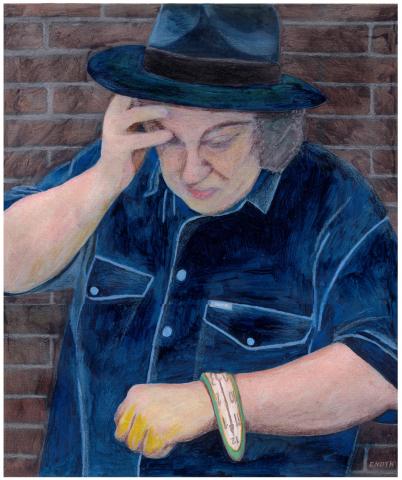
Time is passing by - Peter Nieuwendijk
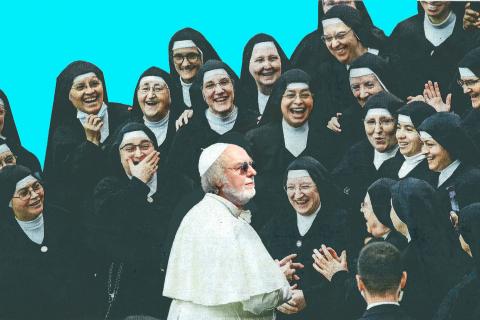
Pope Peter and his ladies - Peter Nieuwendijk
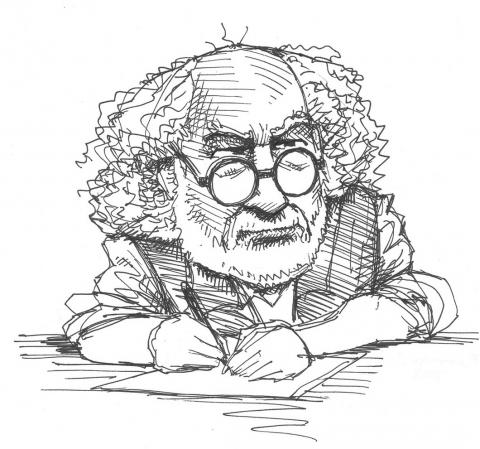
Peter portret
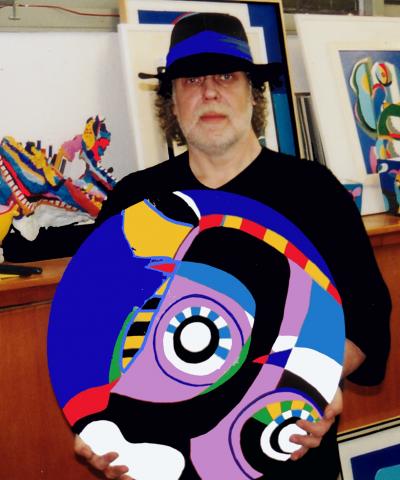
In Studio 1995 - Peter Nieuwendijk
Peter Nieuwendijk AGING WITH HUMOR
By Osvaldo Macedo de Sousa
Peter Nieuwendijk (Amsterdam, 1946) is a Dutch artist who, in addition to his extensive journalistic activity and participant in international competitions (where he won multiple awards), was also producer / director of Cartoon Festivals in the Netherlands, as well as one of the Co-Founders of FECO (Federation of Cartoonist Organizations) (1985). Founder of the Dutch Cartoon Association “De Tulp” (1983). Editor-in-chief of FECONEWS Magazine. General President of FECO (from May 2009 to June 2013)
OMS - The first question that arises: If it is true that the first problem of advancing bodily age is the vision and power of firm hands, creativity, disguised as isms, such as pointillism’s, expressionisms, impressionisms, cubism’s, futurisms... overcome these handicaps over time, with new techniques, with alternative instruments recreating the personal trait? That is, the handshakes, the eyes fail, but the mood persists, or not?
Peter Nieuwendijk - - Yes sure, but it all depends on your personal creativity. When I hurt my right hand (and could not use my arm for 2 years) I started to use my left hand and I taught myself to paint and draw left-handed. Also with left I taught myself to use photoshop as a helping hand.
OMS - Does aging also harm the philosophical view of humour, making it vinegary? With age, with the weight of having lived, existed, criticized repeatedly… does the look become more satirical or ironic?
Peter Nieuwendijk - More ironic. I have seen it all. History repeats himself as younger people do the same things as in the past and they think it is original or brand-new! More satirical, more ironic, but what about me-too? Wars? Environment? Hunger? Climate? Colour? Influencers? Many jokes made 20 years ago are no longer accepted. But it is always a small group who is complaining and who is spreading gossip around by social media, trying to take the power!
OMS - Of course, there are big differences in society, in countries, in geopolitical influences and this always influences the artist's vision, so it's redundant to ask if there are differences between his mood when he started and now, but he can explain what it is in different?
Peter Nieuwendijk - A good cartoonist is never afraid to give his opinion, Always with humour in his message and always understandable and easy “to read” within 6 seconds. In the beginning I started just with graphical jokes with a small message. Getting older, the message and the humour both are important!
OMS - All their lives, others expect a comedian to be a cheerful, fun person. With age, do they continue to ask for the same thing, or do they accept that they too can make vinegar? Or has a comedian always been a vinegary as a dispenser of complicit smiles?
Peter Nieuwendijk - For me it has nothing to do with age. I am still the same person. But I think I have more experience in life to give a clear point of view, overseeing the history, the always repeating history! Getting older does not mean that I am getting weak, more cynical yes, sharper yes, complaining yes (I have seen it all: human kind is not the best kind there is; history proves that!)
OMS - What is more difficult to accept as you get older? Does it take more effort to maintain the mood every day, or is it no longer strength, but a weakness? Do you feel aged? What is old age for you?
Peter Nieuwendijk - Yes getting older means that you got physical problems, not every day is the same, not every day you’re in good mood or sharp enough to create. I always start with coffee, newspaper, making a crossword (or a crypto) to practice my brain.
Old age means that you will be lonely, more lonely loosing good friends. I have lost in the past 20 years many good friends, feeling more and more the survivor and getting invitations to speak at funerals; which I did 19 times until now. Always trying to put some humour in the speeches! Well it is my second nature!
OMS - When looking at the past, is it important to keep the most humorous moment’s alive, relegating tragedies to oblivion, or do they have more force and destroy the best moments of life?
Peter Nieuwendijk - It does not destroy best moments. I keep the memories and cherish those days and years. They’re always on my mind. I carry them with me. Ordinary friends and cartoon colleagues. I know I cannot bring those happy moments back, but it is part of my history, part of my life. Still happy knowing all those moments and persons.
OMS - Is it easier to look at the old age of others than at your own physical "decay"?
Peter Nieuwendijk - Yes.
OMS - What worries you more, lack of memory or physical problems?
Peter Nieuwendijk - Lack a memory seems to me the worst! For physical problems I can take pills or use a mobile car, steps or other orthopaedic materials.
OMS - When you do humour as a hobby, in retirement, it continues as an escape. If you've been a professional for decades, retirement, in principle, is finally rest, but in humor, don't you miss this constant exercise of looking at life in reverse? Is it completely abandoned or does it become an entertainment hobby?
Peter Nieuwendijk - I have always seen it as a hobby. In the first place I am a painter and sculptor who makes also cartoons. I stopped many years ago already to contribute regularly for papers and magazines. I was in the position to make the past 25 year’s only works on request. A paid hobby I guess. That also counts for my contribution in cartoon contests worldwide. I have been published in more than 200 catalogues and won several prizes and special mention. In the beginning I proudly kept all books, but today I give them away or sell them to collectors.
OMS - How was the adaptation to new technologies? The speed of change has been vertiginous, which, on the one hand, has facilitated certain technical procedures; it has also complicated those who did not like the change. How did it happen to you? Do you still prefer classic techniques?
Peter Nieuwendijk - Starting 45 years ago by making all works by hand (pencil, paint etc.), I still use paint and pencil but after that I scan the works and add some colour or graphical “jokes” into the work. It is really progress all those technologies. Problem is that many people can make cartoons by computer. Or think they can make (missing the right spirit) But the real cartoonist will always be known and seen between those amateurs who cannot draw properly.
OMS - Basically, there are many years of witness to changes in society, in political and social behaviour, in addition to the technical ones, that is, you are not only part of history but also a chronicler of that same history. What else has changed? How do you see this evolution, mainly in the activity of the cartoonist (comedian)?
Peter Nieuwendijk - It is a pity that today a few jokes are not possible. Mainly based on stupidity or misinformation. Especially about religion, sex or colour, it seems hard to make funny jokes today. In that way the world has changed. What could be funny in 1960-70-80or even the nineties will be seen today as not funny. Nevertheless I think it is going always in a kind of wave. Maybe in 2030, more will be accepted!
OMS - Technologies change, Humor is the same, but society has changed and put other more complicated obstacles to the freedom of humour. Is there as much or more creative freedom today than before? Political correctness, plus the idiotic susceptibilities of small groups, tribes, clubs, parties… didn't it make censorship more present in published works?
Peter Nieuwendijk - There is a form of self-censorship among some cartoonists. It is a pity to discover that.
Black is black or shall we call it just coloured, bronze, brown? It seems that we have a problem talking about black, white, red, yellow or any other colour. It seems to be offensive specially to use the word black. Only exception is “Black lives matter” (sorry “All lives matter!”).
In The Netherlands (and Belgium) and some parts of the world there is a tradition since the Middle Ages. In December Saint Nicolas is coming. He is a white bishop, dressed in red clothes assisted by Black Knights (named Black Pete). Saint Nicolas is a little bit similar with Father Christmas, however Santa Claus does not have knights, only Rudolph (a deer). They both bring presents to children and grown-ups at the end of the year.
Since three years there is group named “Kick out Black Pete”. They use the history of slavery. Black Knights seems to look like slaves. That’s their opinion. It’s an aggressive group that does not tolerate an other opinion. It is just 5% of the Dutch population. But today other countries are also involved of this typical historical celebration for kids. Even cartoonists are afraid of making jokes about this matter.
Black Pete is mostly a white man or woman who is dressed in colourful clothes and they all paint their face black (that’s the tradition for over 500 years). The assist Saint Nicolas by carrying sweets and presents. The history says that they are black because the enter the houses trough the chimney.
The “Kick out Black Pete group” prefers to paint the faces red, yellow, purple or sooty colour helper. And what about the Chinese or Indians people. Will they be insulted too? If we use those colours?
I partly understand the problem, But we can also exaggerate. Of course there is in some parts of the world not the right equality. But that has nothing to do with this old historical festival for children!
Spanish people use for black the words negro, sucio, malvado or deprimente. Black seems to be a forbidden word. So we have to search for a substitution for ‘black”. No more: Blacklist, black jack, black beetle, black berry, black bird, blackboard, black current, black guard (mine fellow), black leg, black head, black mail, black out, blacksmith, black label, black coffee, black Friday or Saturday, black cross or black humour. Just to call some.
This ‘problem’ seems to be a borderline for cartoonists. As I see in papers, magazines, internet and other digital ways, many cartoonists do not make sharp cartoons. Mostly it is funny, humorous and never offensive. (Yes there are of course cartoonists with a sharp pencil, but that’s an exception I think). For the many international cartoon contests cartoonists makes funny drawings to win money prizes, invitations, travel expense, trophy’s or diplomas, if the organisations (some do) will stick to their own rules. That is another problem. We put those festivals who do not send catalogues, nor prizemoney, nor diplomas on our BLACK LIST. But can we call it in the near future a black list?
OMS - How does the society where you live view the elderly?
Peter Nieuwendijk - Some young people blame all the problems on the elderly people. They have built up this society. But they forget their own responsibility. It is easy to blame problems on others. Many young people has the idea that you should be happy every day, otherwise they call a bad day immediate a burn-out, not understanding that there cannot be a good day without a bad day. Most are much influenced by social media!
OMS - Is it different in the cartoon environment?
Peter Nieuwendijk - For it did not change, but for publishers it did. Some (or even many) magazines and newspapers use some kind of self-censorship!
OMS - What is humor for you and what is its importance in society?
Peter Nieuwendijk - Without humour there is no good life nor understanding. To put (also problems) in an easy funny drawing, it makes life better to survive, to enjoy, to comment, to understand, and to make it lighter and bare able.
OMS - Is senile dementia a variant of absurd humor?
Peter Nieuwendijk - Yes it is!
OMS - Do you believe that humor can help people to better accept aging and be a contribution to the daily optimism of physical decay?
Peter Nieuwendijk - I do not know. The best way to survive is making jokes about yourself and your situation, or age, sickness or whatever. Always smile or try to smile and trying to see the good things in life. However they are sometimes not easy to find.
OMS - Can mental decay be countered by humorous creativity? That is, if there are 12 anecdotes, the rest are already variations in the Bible. With age, is there a tendency to recover old ideas, trying to make new variations, trying to improve them? Is recycling important in humor?
Peter Nieuwendijk - Problem is that there are just 9 ways to produce a cartoon. All others are variations on the same style or theme. I wrote about that (together with John Lent from the University of Philadelphia)
ONS - In old age what is funnier to play with, or to warn others? Physical, mental, social or political issues? Yes it is.
Peter Nieuwendijk – Yes it is.
OMS - Is it easier, or more difficult, for an elderly person to look to the future with humour?
Peter Nieuwendijk – Yes it is. Sometimes thinking over the past and the near (short) future is not always easy. It will always depend on the moment of the day, whether you are today in good shape or not.
OMS - Does death scare you or is dying laughing the best way to close this cycle? Are you concerned about the future of your work after you have left?
Peter Nieuwendijk – Yes I want to live 99 years, but I am afraid that I will not have any friends than. So 88 will be ok for me. No I am not concerned about what will happen with my cartoons. They will be found back now and then in publications and maybe someone will discover the greatness of it all! I am more concerned what will happen with my artworks (the paintings). I am happy that more than 95 works are today in private collections in Holland, Belgium, Germany and France. So people can enjoy, after I passed away. I got the feeling to live longer than. The artworks remain longer than me.
OMS - What is humor for you and what is its importance in society?
Peter Nieuwendijk – The best way to survive is making jokes about others and yourself in any situation. For me it is and has always been a way of life. Also to make it light.
